Interpretation: Resources for the Use of Scripture in the Church (6 vols.)
Digital Logos Edition
Overview
Intended as a companion to the Interpretation: A Bible Commentary for Teaching and Preaching (INT) (43 vols.) commentary series, the Interpretation: Resources for the Use of Scripture in the Church series features resources for those who preach, teach, and study the Bible within the community of faith. Maintaining a core focus of interpreting the Bible well, this new series helps readers navigate key themes, texts, and topics found throughout Scripture as a whole, rather than in a single biblical book. Each series volume is defined by pastoral care and scholarly rigor, illuminates the biblical message for the contemporary church, and provides rich insights that address the most challenging questions posed to the Bible to the modern world. Including contributions from leading scholars such as Robert Jensen and Patrick Miller, this series promises to serve the faith and intellectual life of the church for years to come.
Key Features
- Provides biblically based answers that are exegetically based and take account of Scripture’s unique hermeneutical challenges
- Addresses the modern world’s most difficult questions and the Bible’s most critical passages
- Features a unique emphasis on scholarly rigour with keen attention to the life and witness of the church
Product Details
- Title: Interpretation: Resources for the Use of Scripture in the Church (6 vols.)
- Series: Interpretation: Resources for the Use of Scripture in the Church
- Publisher: Westminster John Knox Press
- Volumes: 6
- Pages: 1,832
- Resource Type: Biblical Theologies
Individual Titles
- Biblical Prophecy: Perspectives for Christian Theology, Discipleship, and Ministry by Ellen F. Davis
- Canon and Creed by Robert W. Jenson
- Reading the Parables by Richard Lischer
- The Sacraments in Biblical Perspective by Ronald P. Byars
- The Ten Commandments by Patrick D. Miller
- Violence in Scripture by Jerome F.D. Creach
This title is included in the following collections
You can save when you purchase this product as part of a collection.
Interpretation: Resources for ...
$334.88$267.992025 Collector's Edition Libra...
$10,999.99$8,249.992025 Ultimate Library
$23,999.99$17,999.99
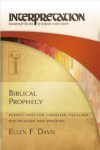
In this fresh and expansive work, Ellen Davis offers a comprehensive interpretation of the prophetic role and word in the Christian Scripture. Davis carefully outlines five essential features of the prophetic role and then systematically examines seven representations of prophets and prophecies.
Thoroughly theological in nature, Davis’s volume provides both instruction and insight for understanding prophecy in Christian tradition and discipleship. This volume concludes with a rich discussion of practical matters, including the relationship between Christian discipleship and prophetic interpretation and the role of biblical prophecy in interfaith contexts.
Ellen Davis is exactly the right scholar for this topic at this moment in our interpretive work. She combines an acute critical sensibility with a keen commitment to the practice of the church in contemporary society. This book will greatly enliven our interpretive conversation as she leads us to fresh thinking in many directions.
—Walter Brueggemann, William Marcellus McPheeters Professor Emeritus of Old Testament, Columbia Theological Seminary
Ellen Davis combines a mastery of modern biblical scholarship with an appreciative use of classic Jewish understandings and the interests of a thoughtful contemporary Christian before the biblical text. The result is an immensely readable account of prophecy, which is both intellectually and spiritually enlarging.
—Walter Moberly, professor of theology and biblical interpretation, Durham University
Ellen Davis’s engaging study more than fills the gap between biblical prophecy and theological inquiry. Her wide-ranging treatment is rich and relevant, bringing the ancient prophetic characters of Scripture, from Abraham to John of Patmos, and their words to life for readers today. Davis demonstrates once and for all that the church remains in need of prophetic interpreters for its own sake and for the world’s.
—William P. Brown, William Marcellus McPheeters Professor of Old Testament, Columbia Theological Seminary
Ellen F. Davis is professor of Old Testament at the Protestant Episcopal Theological Seminary in Virginia.She has authored several books, including Westminster Bible Companion: Proverbs, Ecclesiastes, and the Song of Songs, Swallowing the Scroll: Textuality and the Dynamics of Discourse in Ezekiel’s Prophecy, and coedited The Art of Reading Scripture.
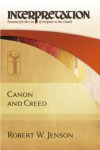
How does the church understand the relation between its Scripture and its creedal formulations? Robert W. Jenson answers this important question by showing how canon and creed work are interdependent, and that neither is an adequate or sufficient to guide Christian faith without the help of the other. His book enables contemporary teachers, pastors, and laity to deal with ever-present questions and tensions as the church seeks to hold canon and creed together.
Jensen helps us see what should be obvious: the canon of Scripture and the creeds of the church serve as interlocking witnesses to the Christ-centered truth. Our reading of Scripture is made possible by our knowledge of the church’s teaching, and, at the same time, creed and dogma gain their substance and weight in and through our reading of Scripture. A must-read for students and pastors who want to unify their exegetical and theological imaginations.
—R.R. Reno
Robert W. Jenson is an American Lutheran systematic theologian and professor emeritus of religion at St. Olaf College in Northfield, MN. Currently he is a professor of religion at the Center for Theological Inquiry at Princeton Theological Seminary. He has authored or contributed to many books, including Christian Dogmatics, Lutheranism: The Theological Movement and Its Confessional Writings, and Marks of the Body of Christ.
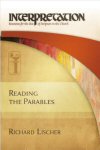
Parables make up one-third of Jesus’ speech in the New Testament. In this volume, Richard Lischer provides an expert guide to these parables and proposes an important distinction between reading and interpreting the parables.
Lischer emphasizes the importance of reading the parables versus interpreting them. He asserts that reading offers a kind of breathing space to explore historical, literary, theological, and socio-political dimensions of the parables and their various meanings. Interpreting a parable implies an expert and critical position that must also be defended.
Lischer lays out four theories for reading parables. First, parables obscure truth. Second, parables teach many truths. Third, parables teach one truth. Fourth, parables undermine the truth. Ultimately, the author concludes that biblical parables undermine dominant myths called “the truth” to shine light on the Truth that is Jesus, God’s presence with mankind.
With his keen literary eye and finely tuned theological perception, Richard Lischer teaches us how to read the parables of Jesus anew, to read them not merely by ourselves or for ourselves but in the company of many others. Lischer enables us to read these great texts with the Gospel writers, with the poor, with the saints, and with all who are in the human condition; and as a result of Lischer’s wise guidance, the parables have ’perpetual youth,’ as Irenaeus would say, and overflow with abundance. This is a contribution to parables studies not to be missed.
—Thomas G. Long, Bandy Professor of Preaching, Candler School of Theology, Emory University
From master teacher, preacher, and scholar, Richard Lischer, we receive the gift of a close and faithful reading of the parables. His perspective illuminates the parables’ potency for any human condition, whether poor or privileged. These stories told by Jesus still speak today and are not only to be read but also lived out in the world. Beware, reader—this is not just an interpretation; this is faith-filled gospel proclamation!
—Luke A. Powery, dean of the chapel, Duke University
Paraboles à la Lischer: Sift approximately twoscore years of homiletics with a decade of pastoral experience. Measure organic, free-range historical study of Scripture into a batter comprising a cup of literary cream, finely grated philosophy, and a dash of political pepper. Whisk in zest of imagery and words freshly squeezed. Carefully strain out all clichés; never overwork the mixture. Pour the blend evenly into a deep theology and bake over a steady, high intelligence. Let cool slightly though not completely before devouring. Yield: Incalculable.
—C. Clifton Black, Otto A. Piper Professor of Biblical Theology, Princeton Theological Seminary
This is the book I have been waiting for! Lischer generously takes account of the wide range of approaches to Jesus’ parables both academic and homiletical. He shows how these gospel mini-stories that we know so well crack open to reveal glimpses of surprising radiance that can quicken our own imaginations, provoke transformative action in our communities, and guide us in the parabolic art of preaching itself.
—Heidi B, Neumark, pastor, Trinity Lutheran Church of Manhattan
It is easy to use the parables of Jesus as metaphors for our own agenda. But this book courageously plunges us into the role these ’stories’ played in the first century, and along the way the reader gets a breathtaking new glimpse of the Word of God.
—M. Craig Barnes, president, Princeton Theological Seminary
Richard Lischer is the James T. and Alice Mead Cleland Professor of Preaching at Duke Divinity School. He has authored or contributed to many books, including A Theology of Preaching: The Dynamics of the Gospel, The End of Words: The Language of Reconciliation in a Culture of Violence, and The Company of Preachers: Wisdom on Preaching, Augustine to the Present.
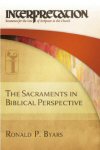
Offers a comprehensive look at the theology of sacraments, this volume explores one of the church’s most misunderstood—but most essential—practices. For many church people, worship is about preaching and music. Baptism and the Lord’s Supper are occasional additions to Sunday services. Recognizing that church-goers are uncertain about the need for sacraments, Ronald Byars describes the possibility that the very act of worshipping—the actions observed, the postures assumed, the sound and sight of water, the smell and taste of bread and wine—subtly alter the temper of the heart and the mind. If Christians encounter the sacraments honestly, they act as a gateway to the very heart of the gospel.
Grounded in a deep examination of Scripture, liturgucal resources, and hymnody, this book generously invites us to embrace (or re-embrace) in both our minds and hearts, he formative significance of font and table. It is destined to be one of the most important liturgical texts of our time!
—Theodore J. Wardlaw, president and professor of homiletics, Austin Presbyterian Theological Seminary
Ronald P. Byars is professor emeritus of preaching and worship at Union Theological Seminary and Presbyterian School of Christian Education in Richmond, Virginia. His previous books include Lift Your Hearts on High and The Future of Protestant Worship.
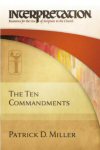
In this volume, Patrick D. Miller studies the Ten Commandments as both an ancient document and as a contemporary guide. With careful attention to each commandment in its original context, this book shows readers the modern relevance of these basic principles, as well as how the ideas of each commandment influenced the New Testament. More than an intellectual exercise, The Ten Commandments applies the call of the commandments to modern-day issues.
Miller’s knowledge of the Commandments translates into a most appealing set of reflections for believing Christians, showing how the Commandments are not fixed truths but rather texts demanding interpretation. They resonate in the life of the contemporary world around such topics as the necessity of truthfulness, the dangers of desire, and the struggle to honor parents, to name but a few. Miller’s updated approach to the Commandments will benefit classes, study groups, and anyone interested in living an ethical life rooted in biblical texts.
—Kathleen M. O’Connor, William Marcellus McPheeters Professor of Old Testament, Columbia Theological Seminary
Patrick D. Miller is Charles T. Haley Professor Emeritus of Old Testament Theology at Princeton Theological Seminary in Princeton, New Jersey. He has written numerous books, including Israelite Religion and Biblical Theology: Collected Essays, In Search of the Common Good, and Interpretation: A Bible Commentary for Teaching and Preaching Deuteronomy.
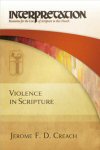
The Bible frequently depicts God as angry and violent, and sometimes depicts human violence as positive or even as commanded by God. This forms one of the most vexing problems in approaching Scripture and interpreting the Bible for preaching and teaching today. In this volume, Jerome Creach first examines the theological problems of violence and categorizes the types of violence that appear in Scripture. He then wrestles with the most important biblical texts on violence in order to work through specific interpretational issues. This volume in the Interpretation: Resources for Use of Scripture in the Church series will help preachers and pastors interpret these difficult texts, encouraging them to face violence in the Bible with honesty.
Creach models rigorous scholarship within the perspectives of robust faith. He thereby sheds new light on a major contemporary problem. This should enable fresh understanding and confident use of the Bible in Christian ministry and preaching.
—Walter Moberly, professor, Department of Theology and Religion, Durham University
Recent critics have suggested that the Bible’s narratives and biblical monotheism promote various forms of religious violence. In this book, Jerome Creach demonstrates that such accusations are often based on facile (mis)readings of the biblical text. With theological sophistication, Creach reveals that frequently the texts under discussion contain critiques of the very violence some claim the Bible endorses. Even those who may question some of Creach’s interpretations will learn much about how Christians and others can read troubling biblical texts generously and productively.
—Joel S. Kaminsky, professor, Religion Department, Smith College
In his book Violence in Scripture, Jerome Creach investigates multiple aspects of violence as a problem in biblical texts. He draws primarily upon Old Testament passages that appear to condone violence in God and humans. He shows how historical circumstances affect and complicate understandings of violence. He uncovers self-correcting elements of the scriptures that challenge violence of God and of human. He locates violent passages within larger canonical contexts that correct or modify the place of violence. He concludes that God’s hopes for humans and the world are essentially non-violent. God created the world without violence, and Jesus brings Old Testament themes of non-violence to fulfillment in the New. Creach’s study is clear and insightful, and it promises to provoke thoughtful reflection among pastors, teachers, lay people, and scholars.
—Kathleen M. O’Connor, William Marcellus McPheeters Professor of Old Testament, Columbia Theological Seminary
Creach demonstrates clearly and convincingly that the Bible is not an inherently violent book (as some suppose) and that it certainly does not authorize violence in the human community. Drawing upon the latest and best historical-critical research, along with canonical perspectives and insights from the history of biblical interpretation, Creach shows that the Bible from its very beginning portrays a God who wills comprehensive peace and well-being for all people and all creation. Given our current culture of violence (in which the church is often complicit), Creach’s work is an extraordinarily timely and valuable contribution to biblical theology. It should serve as an indispensable resource for church members and church leaders as we confront violence in self and society, and as we pursue the peace that God wills.
—J. Clinton McCann, Jr., evangelical professor of biblical interpretation, Eden Theological Seminary
Jerome F.D. Creach is assistant professor of religion at Barton College, Wilson, North Carolina and an ordained minister in the Presbyterian Chuch (U.S.A.). He has written numerous books, including Yahweh as Refuge and the Editing of the Hebrew Psalter, Interpretation: A Bible Commentary for Teaching and Preaching Joshua, and Psalms: Interpretation Bible Studies.
Reviews
4 ratings
Jim Rudolph
5/13/2019

Eric Hillegas
3/19/2017

Mark Nolette
1/4/2017
Excellent resources! I hope that Logos will soon offer an upgrade with the new Walter Bruggemann volume on "Money and Possessions".
Dale Durnell, Retired UM Clergy
9/1/2016
I have the hard copies of The Ten Commandments, Canon and Creed, and The Sacraments. I've been waiting, most patiently, for these superior resources to show themselves in Logos. I'm delighted to see that they will soon be part of my digital library